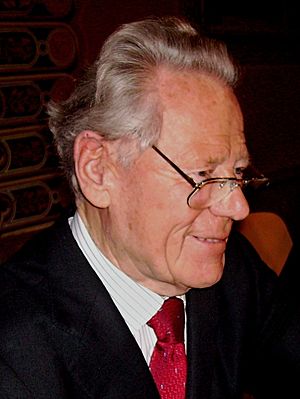Hans Küng facts for kids
Quick facts for kids
Hans Küng
|
|
|---|---|

Küng in 2009
|
|
| Born | 19 March 1928 Sursee, Switzerland
|
| Died | 6 April 2021 (aged 93) Tübingen, Germany
|
| Nationality | Swiss |
| Alma mater |
|
| Occupation |
|
| Signature | |
 |
|
Hans Küng (19 March 1928 – 6 April 2021) was a Swiss Catholic priest, a scholar of religion (called a theologian), and an author. He was known for trying to find common ground between different religions and for encouraging changes within the Catholic Church. From 1995, he led the Foundation for a Global Ethic, which worked on shared values for all people.
Küng became a priest in 1954. In 1960, he started teaching at the University of Tübingen in Germany. He also served as an expert advisor during the Second Vatican Council, an important meeting that updated the Catholic Church. Later, in 1978, he disagreed with the idea of papal infallibility (that the Pope cannot be wrong on matters of faith and morals). Because of this, he was no longer allowed to teach as a Catholic theologian. However, he continued to teach at Tübingen as a professor of ecumenical theology (which focuses on unity among Christian churches) until he retired in 1996. He remained a Catholic priest throughout his life.
Küng believed in the spiritual side of religion but questioned some old Christian teachings. He wrote many books, including Christianity and the world religions: paths of dialogue with Islam, Hinduism, and Buddhism (1986). He also wrote Dying with Dignity (1998) with Walter Jens. He received many awards and honorary degrees from universities around the world. An asteroid, a small rocky body in space, was even named after him!
Contents
Life and Work
Early Life and Education
Hans Küng was born in Sursee, Switzerland. He was the oldest of seven children. His father owned a shoe store. Hans studied philosophy and theology in Rome, Italy, and became a priest in 1954. He gave his first Mass (a Catholic church service) in St. Peter's Basilica, speaking to the Swiss Guard, many of whom he knew.
He continued his studies in Europe, including in Paris, France, where he earned a special degree in theology in 1957. After his studies, he worked as a priest in Lucerne, Switzerland, for two years. Just before Pope John XXIII announced plans for a new church council in 1959, Küng gave a hopeful speech about reforming the Catholic Church.
Teaching Career
Küng taught at the University of Münster for a year. Then, in 1960, he became a professor at the University of Tübingen in Germany. That same year, he published his first book, The Council, Reform and Reunion. This book described many ideas that later became part of the upcoming church council. It became a bestseller in many countries.
In 1962, Pope John XXIII chose Küng to be an expert advisor (called a peritus) for the Second Vatican Council. At 34, he was the youngest advisor. He served until the council ended in 1965. Küng also helped bring another important theologian, Joseph Ratzinger (who later became Pope Benedict XVI), to teach at Tübingen.
In 1963, Küng visited the United States. He gave popular lectures about "The Church and Freedom" to large crowds at many universities. He even met with President John F. Kennedy at the White House. Kennedy introduced him as "a new frontier man of the Catholic Church."
Challenging Church Teachings
Küng's doctoral paper was published in English in 1964 as Justification: The Doctrine of Karl Barth. In this book, he explored how the ideas of a famous Protestant theologian, Karl Barth, were similar to Catholic teachings. He believed that the differences between them were not big enough to divide the Church.
In the late 1960s, Küng became well-known for questioning the idea of papal infallibility. This is the belief that the Pope cannot make mistakes when speaking officially about faith and morals. He wrote about this in his 1971 book, Infallible? An Inquiry. He also spoke out against other church rules, such as the requirement for priests to remain unmarried. He believed that priests should be allowed to marry and that women should be able to become priests.
Because of his views, the Vatican (the center of the Catholic Church) asked him to explain his ideas. On December 18, 1979, he was no longer allowed to teach as a Catholic theologian. Many theologians in America and Canada supported him. A thousand students at Tübingen held a protest. Küng later called this experience "my personal experience of the Inquisition." Despite this, he remained a priest. The university created a special institute for him, allowing him to continue teaching ecumenical theology until he retired in 1996.
Global Ethic and Dialogue
In the early 1990s, Küng started a project called Weltethos (which means "Global Ethic"). This project aimed to find common values and rules of behavior that all the world's religions could agree on. His ideas were put into a document called Towards a Global Ethic: An Initial Declaration. This declaration was signed by religious leaders from around the world at the 1993 Parliament of the World's Religions.
Küng's work on a global ethic was part of the United Nations Year of Dialogue Among Civilizations in 2001. He was one of 19 "eminent persons" chosen to lead this effort.
Küng often spoke out for other theologians who faced difficulties with the Vatican, like Charles Curran and Eugen Drewermann. He believed that the Church should be more open to new ideas and discussions. In 2003, he criticized the beatification (a step towards sainthood) of Pope Pius IX, seeing it as a political move rather than a spiritual one.
In 2005, Küng had a friendly meeting with Pope Benedict XVI at Castel Gandolfo. They focused on Küng's work on interreligious dialogue and shared human values, avoiding their disagreements. Küng said he approved every word of the Vatican's statement about their meeting.
However, in 2009, Küng strongly criticized Pope Benedict for allowing four bishops from a traditionalist group to return to the Church. He worried that the Church might become like a small, isolated group. In 2010, he wrote an open letter to all Catholic bishops, asking them to consider reforms and even another Vatican Council. He was also a signer of "Church 2011, The Need for a New Beginning," a document calling for reforms in the Catholic Church.
Hans Küng passed away at his home in Tübingen on April 6, 2021, at the age of 93. Many people, including his fellow theologian Charles Curran, remembered him as a strong voice for reform in the Catholic Church.
Key Writings
In his book On Being a Christian (1974), Küng explored the origins of Christianity. He looked at the Gospels to understand the historical Jesus. Instead of starting with church councils, he wanted to understand Jesus as a real person first. He asked if it would be better to begin with "the real human being Jesus, his historical message and manifestation, his life and fate... and then ask about the relationship of this human being Jesus to God."
In 1998, he published Dying with Dignity, which he wrote with Walter Jens.
In 2005, Küng wrote an article criticizing John Paul II's time as Pope. He felt that the world had hoped for reform and dialogue, but instead, Pope John Paul II had brought back older traditions and stopped reforms.
In his book Der Anfang aller Dinge (The beginning of all things), Küng discussed how science and religion relate to each other. He explored topics from quantum physics to neuroscience. He also commented on the debate about evolution in the United States, calling those who oppose teaching evolution "naive."
In his 2010 book Was ich glaube (What I Believe), he wrote about his personal connection with nature. He explained how he learned to appreciate God's creation without falling into a false love of nature.
Awards and Honors
- 1991 Swiss culture prize
- 1992 Karl Barth prize
- 1998 Theodor Heuss Foundation prize
- 1998 Interfaith gold medallion from the International Council of Christianity and Judaism, London
- 1999 Federation of Lutheran cities prize
- 2003 Knight Commander's Cross of the Order of Merit of the Federal Republic of Germany
- 2005 Niwano Peace Prize
- 2005 Baden-Württemberg medal
- 2006 Lew Kopelew Prize
- 2007 German freemasonry cultural prize
- 2007 Honorary Citizen of City of Tübingen
- 2008 Honour for civil courage by the circle of friends Heinrich Heine (Düsseldorf)
- 2008 Otto Hahn Peace Medal in Gold from the United Nations Association of Germany (DGVN) in Berlin, for "outstanding services to peace and international understanding, especially for his exemplary employment for humanity, tolerance and the dialogue between the great world religions"
- 2009 Abraham Geiger prize from the Abraham-Geiger-Kolleg at the University of Potsdam
- 2017 Asteroid 190139 Hansküng, discovered in 2005, was named in his honor.
Honorary Doctorates
Küng received many honorary doctorates from universities around the world, including:
- Saint Louis University (1963)
- Pacific School of Religion, Berkeley/California (1966)
- Loyola University Chicago (1970)
- University of Glasgow (1971)
- University of Toronto (1984)
- University of Cambridge/UK (1985)
- University of Michigan, Ann Arbor (1985)
- University of Dublin/Ireland (1995)
- University of Wales, Swansea (1999)
- Ramapo College New Jersey (1999)
- Hebrew Union College-Jewish Institute of Religion, Cincinnati (2000)
- Florida International University (2002)
- Ecumenical Theological Seminary in Detroit/US (2003)
- University of Genoa (2004)
- Universidad Nacional de Educación a Distancia in Madrid (2011)
Images for kids
See also
 In Spanish: Hans Küng para niños
In Spanish: Hans Küng para niños
- Parliament of the World's Religions
- Towards a Global Ethic: An Initial Declaration
 | Ernest Everett Just |
 | Mary Jackson |
 | Emmett Chappelle |
 | Marie Maynard Daly |


